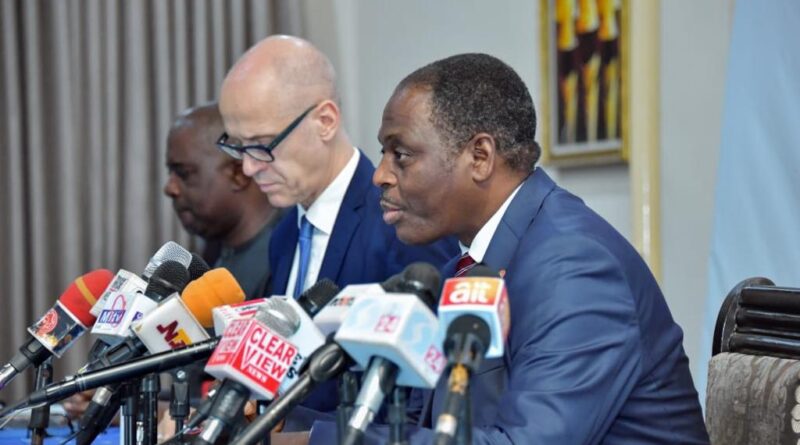Drug War: 31,675 Arrests; 5,147 Convictions; 6.3million Kilogrammes Of Illicit Drugs Seized By NDLEA In 29 Months – Marwa
By Bukar Bolori
The National Drug Law Enforcement Agency (NDLEA) has arrested 31,675 drug offenders, out of which 5,147 of them were prosecuted and convicted with over 6.3 million kilogrammes of assorted drugs seized since the appointment 29 months ago of the Chairman/Chief Executive Officer of the agency, Brig. Gen. Buba Marwa (Retd).
The NDLEA boss while addressing a joint press briefing in Abuja on Monday with the Country Representative of the United Nations Office on Drugs and Crime, UNODC, Mr. Oliver Stolpe, said the fight against substance abuse and illicit drug trafficking has yielded significant results in the last 29 months since he came on board with the arrest of 31,675 drug offenders, 5,147 of them prosecuted and convicted while over 6.3 million kilogrammes of assorted drugs were seized within the same period.
Marwa, who was represented at the press conference to flag off a weeklong activities marking the 2023 World Drug Day, which is an annual event by the agency’s Secretary, Shadrach Haruna noted that the event “is to mobilise resources, align policies, and inspire organisations, communities, and nations to work in a particular direction to effectively tackle the challenges of illicit substances in society.”
He said: “This year’s theme, “People First: Stop Stigma and Discrimination, Strengthen Prevention,” is in furtherance of the whole-of-society approach to taming the drug scourge.
“This theme is especially pertinent to the Nigerian situation at the moment. In the past two and half years, we have strengthened our law enforcement efforts to cut down on the supply of drugs in society. In 29 months, we have arrested 31,675 drug offenders, including 35 barons; successfully prosecuted and got convicted 5,147 of them, and over 11,000 other cases still pending in court, while 23,725 drug users had been counselled and rehabilitated, majority of them through brief interventions. At least 6.3 million kilogrammes of various illicit substances have been recovered in response to our efforts to sweep up drugs and shut down the distribution channels.
“We have destroyed 852.142 hectares of cannabis farms and dismantled three clandestine methamphetamine laboratories. I can assure you that even as we speak, NDLEA agents are busy with interdiction activities somewhere.”
He, however, said that drug supply reduction remains only one of the components of the equation, stressing that: “Another crucial component is drug demand reduction, which operationally means prevention, treatment and rehabilitation. It should go without saying that we must strike a balance between these two crucial components if we are to achieve our desired utopia of a drug-free society.
He disclosed that: “NDLEA has made significant investments in prevention, treatment and rehabilitation over the last two years. The doors of our rehabilitation facilities are open at all times. In the last 29 months, we have acquired a few more rehab centres, given to us as donations, while we have also obtained the federal government’s approval for the construction of regional model rehabs.
“More private treatment facilities are also cooperating with NDLEA. To cap it all, NDLEA went above and beyond to invest in a toll-free, round-the-clock call centre that provides teletherapy. In summary, we have prioritised treatment, while our WADA advocacy initiative has taken a life of its own with our Commands, Formations and partnering civil society organisations taking sensitisation lectures and campaigns to schools, communities, worship places and many more across the country everyday.
“In addition, we have also produced TV commercials and radio jingles in different languages being broadcast on various platforms. This is simply aimed at prevention, by sensitising the people and equipping them with facts about drugs to enable them take the right decisions against substance abuse”.
He, however, charged the society to drop the stigmatization that discourages drug users from seeking treatment, a development, which he lamented, has serious socio-economic repercussions for individuals and their families.
He decried that: “Stigmatisation and discrimination make recovery and reintegration difficult for drug-dependent users who submit themselves to treatment. And the prevalence of such an attitude is counterproductive to the effort, time, and resources invested by governments, institutions, and corporate bodies working to contain the drug problem.
“This is what the year’s theme is about. We must rid ourselves of any bias against those who are drug-dependent to be able to support, expedite, and make permanent their recovery. The theme will serve as an impetus for us to make a collective effort to break down these invincible but formidable social barriers that undermine the attainment of the goal of a drug-free society.”
Marwa expressed appreciation for the partnership between NDLEA, NGOs, development partners, and the various groups, institutions, and relevant professionals in society, including media professionals, who have been very supportive of the renewed war on drugs.
He said: “I want to thank the United Nations Office on Drugs and Crime (UNODC), especially for its unquantified support that has contributed to the rapid evolution of NDLEA. In the same vein, we are thankful to the European Union (EU) and the governments of the United States, United Kingdom, France, India and Germany, who have all boosted our capacity to cope with the demands of our mandate.”
He disclosed that: “To celebrate this year’s World Drug Day, we have a line-up of activities for the week, some of which will be conducted in partnership with our stakeholders like the UNODC and MTN Foundation. Some of the events are educational, like the essay and the quiz competitions. We have days set aside for events like the Walk Against Drugs, NGO activities, and a campaign to raise awareness among young people who are not in school. The grand finale will be the ceremony at the State House on Monday, June 26.”
In his remarks at the media briefing, UNODC Country Rep, Oliver Stolpe emphasized the “benefits of international cooperation in criminal justice matters with a specific target of dismantling trafficking networks involved in this terrible trade.”
Stolpe added that: “Long overdue is the need to make sure that the public and primary health care providers are better prepared to take basic drug counseling needs, knowing how to deal with people suffering from drug use disorders.”
He commended NDLEA for the successes recorded so far in the fight against substance abuse and illicit drug trafficking in the country.




